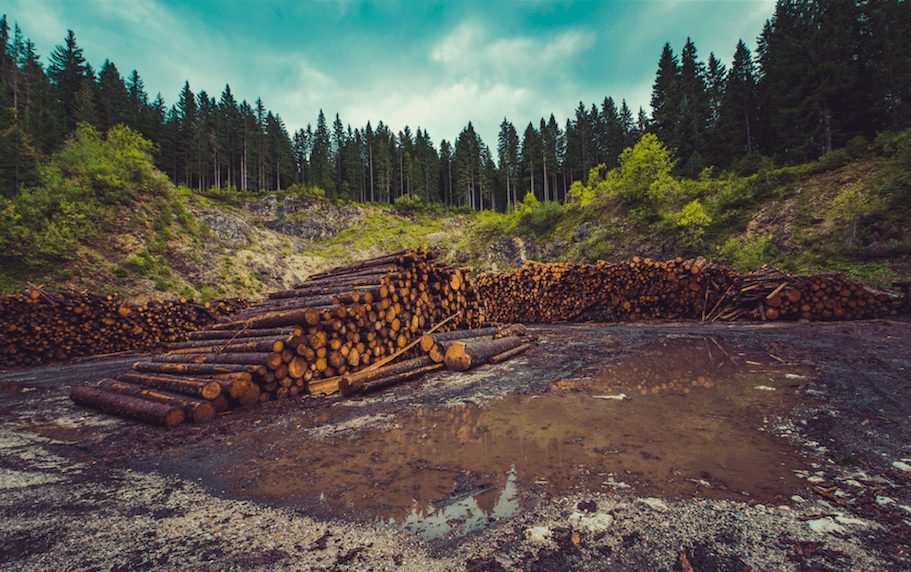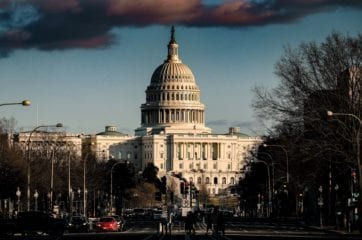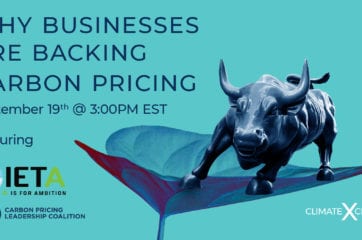BY MARIA VIRGINIA OLANO, AUGUST 2nd 2018
Much like a business, our planet has a budget. If it exceeds that budget it is borrowing resources, like a business requiring a line of credit. The difference is that the business owner is hedging its bets against future profit, while in over consuming natural resources, we are hedging ours against future generations.
Most, if not all businesses take out a line of credit as they grow. This requires them to have a plan, budget, and idea for when they will round the corner and close that gap. Why are we not treating our planet the same way?
Yesterday was “Earth Overshoot Day”, the day when the world consumed more natural resources than it can regenerate in a full year. This is the earliest date we have reached the threshold so far. In 1970, the date was December 29, back then we were consuming just about as much resources as the Earth could sustain. Today, in contrast, we are using about 1.7 Earths worth of resources per year.
The date of Earth Overshoot Day is calculated by the Global Footprint Network, by comparing humanity’s total yearly consumption (ecological footprint) with Earth’s capacity to regenerate renewable natural resources in that year (biocapacity).
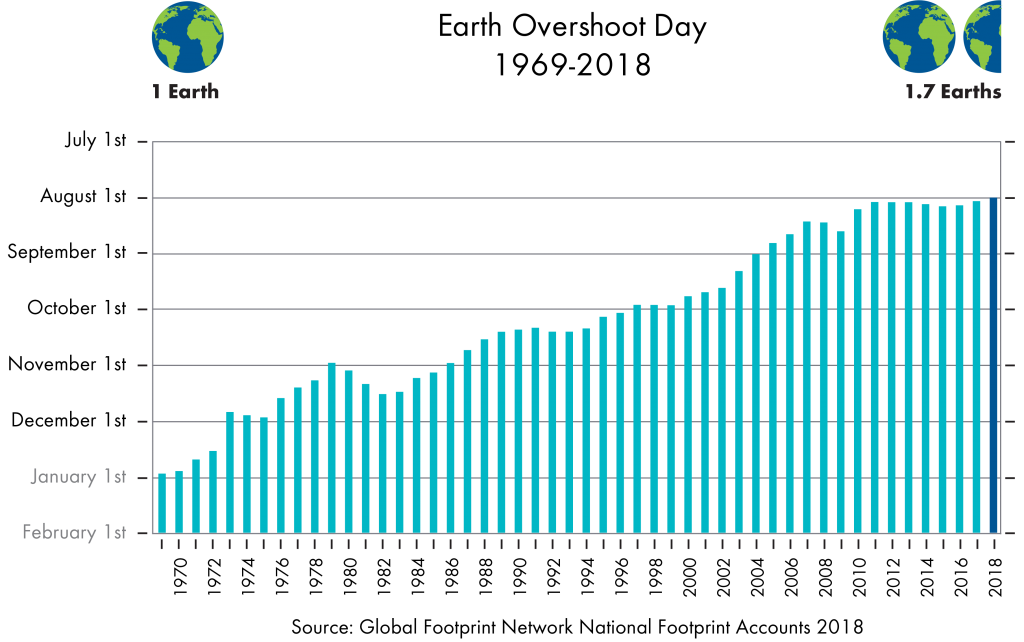
What exactly does it mean to overshoot our resources? Simply put, it means our demand for ecological resources and services exceeds the rate at which the natural systems in the planet can regenerate them.
In a system as massive as the Earth’s, with such vast varieties of resources and uses for those resources, it can be hard to conceptualize the issue. So let me put it this way: what if, on August 1st of any given year, a business was to use up its budget for the entire year? Would you, as a business owner, manager or employee, accept the fact that your business was going under? More likely, you would have to make some drastic changes. Letting go employees, cutting back costs, and taking on debt would be some of your options. As a business, you would want to take measures to be protected against such worst case scenarios. You would have data and plans in place to ensure that you have enough resources to carry you through the year, or at the very least a plan to feasibly get them.
So why is it that we don’t use this kind of common sense approach to managing our planet’s resources, too? How can we use a business approach to rethink our relationship with our planet and its finite resources?
We have in fact, been exceeding the Earth’s capacity since the 1970’s, maintaining this deficit by liquidating stocks of ecological resources and accumulating waste, mainly in the form of carbon dioxide in the atmosphere. This overshoot operation and the rate of CO2 accumulation in our atmosphere, is what has also caused global climate change. In turn, the changing climate has also brought about compounding threats, such as sea level rise, floods, increased heat waves, etc. Think of climate change as the bill our planet is passing us for the deficit we have run it into for decades.

“As we mark Earth Overshoot Day, today may seem no different from yesterday—you still have the same food in your refrigerator,” said Global Footprint Network CEO Mathis Wackernagel. “But fires are raging in the Western United States and in Cape Town, South Africa, residents have had to slash water consumption in half since 2015.
“Our economies are running a Ponzi scheme with our planet. We are using the Earth’s future resources to operate in the present and digging ourselves deeper into ecological debt.” If we would not allow our businesses to run into such debt, why allow our planet to? In truth, we have failed to act, despite the fact that for many decades, science has been warning us of the impeding consequences of such misuse.
Some good news here is the fact that our overshoot trends have not dramatically changed since 2011. Perhaps this is a consequence of growing awareness of the issues, and an increase in sustainably-minded businesses popping up all over the world. More needs to be done, at a much faster pace if we are to push back this date and go back to a sustainable use of the Earth’s resources. Much of this starts at the local, and even individual level.
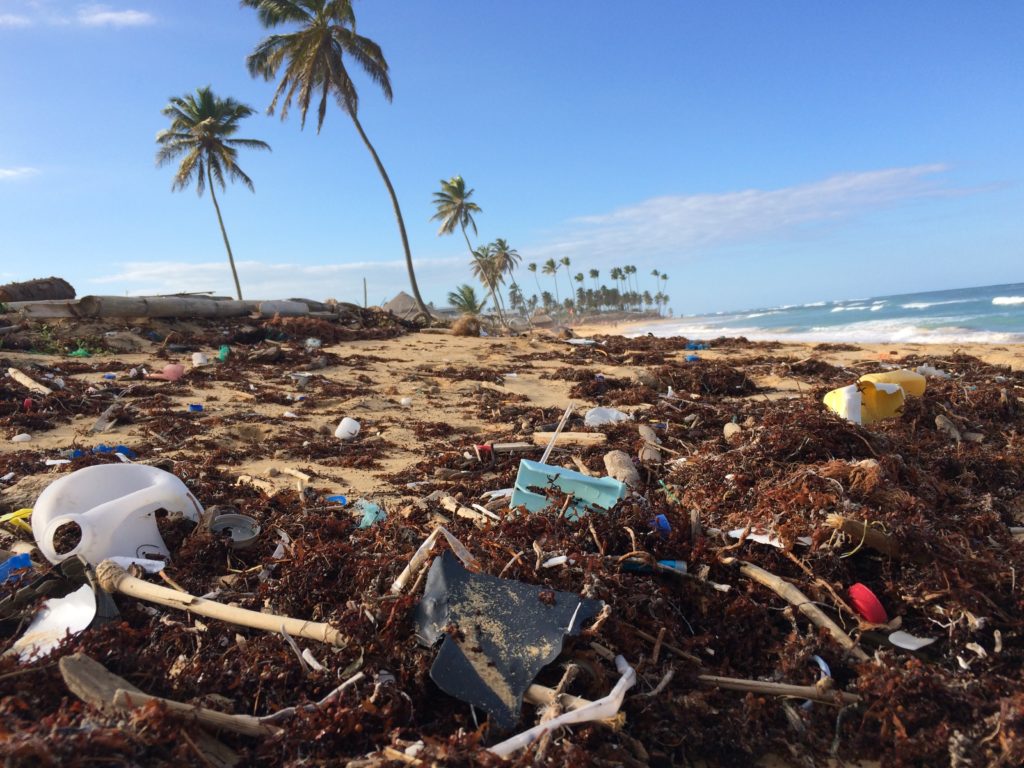
How can your business help ‘move the date’?
1. Assess your supply chain & sourcing
To make progress on environmental issues, it is crucial to understand your business as part of a larger system. Your supply chain can have a large impact on your carbon footprint as well as your resource use. By working closely with their suppliers, and choosing to buy as local as possible, companies can lessen their environmental and social impacts while at the same time reducing the carbon footprint of your products. By switching to more local sourcing, you can reduce the transportation emissions from bringing further materials to you. But you are also supporting the local economy, and ultimately investing in your community, and placing yourself as a local leader.
2. Engage your staff
Start conversations with your employees about sustainable practices. There is a lot that can be done at the individual level, so provide that knowledge and share ways in which as a team, you can all become more sustainable.
One idea is starting ‘meatless mondays’ at the office. There are widespread environmental benefits to cutting meat out of your diet, or even reducing its consumption. You can also encourage the use of reusables, such as reusable bags for grocery shopping, or reusable food containers for whenever you buy lunch. Member business, City Compost, makes it easy to compost at the office. They can provide single-point or multi-point compost collection throughout your workplace.
More than a quarter of US greenhouse gas emissions come from transportation, according to the EPA . So a good way to reduce carbon emissions is by encouraging greener commutes. Use incentives for your employees to use public transport, or other forms of low carbon transport, such as carpooling or biking. Such incentives can help you attract and retain workforce talent, while also reducing your emissions.
3. Think circular & conduct waste audits
Waste and the amount of it we each produce every day is a big part of the problem. We have gotten used to a convenience-driven lifestyle and along the way have compromised on sustainability. There is growing awareness about the harmful environmental impacts of single use plastics, for instance, and a trend shifting away from them. There is still an urgent need to redefine the way we think about and use waste.
Conducting waste audits is a good way to take stock of your businesses’ waste outputs, and understand ways in which you can reduce or reuse that waste. Is most of your trash food waste? It might make sense to think about composting options. If most of your trash is made up of single use coffee cups, think about how you can incentivize reusable alternatives. Businesses can reap economic benefits from closing the loop on post-consumer products, while also reducing the amount of raw materials extracted from nature.
4. Know your energy needs
Start off by making sure you are only using the energy you actually need. Some simple first steps could be to always ensure that your lights and AC are off at the end of each day, or using energy efficient light bulbs and adjusting thermostats. Are there times of day when you can turn off certain parts of your operation? Doing this will cut back on costs of business, and reduce your emissions.
f you are thinking about making the switch towards renewables you can also explore local incentive programs, and assess if investing in solar panels now will reap savings in the long term. Even if this is not possible for your business right now, you can make better choices when investing in replacing infrastructure, such as renting in buildings with LEED certification or with modern weatherization.
5. Join CABA
Do you think your business may benefit from learning about sustainable supply chains? Have you been interested in finding out about the benefits of carbon pricing? Has your business been affected by any of the recent climate events?
The Climate Action Business Association gathers like-minded local businesses, creating a community of shared values. Join our over 130 members today for an opportunity to learn best practices in sustainability, have your voice heard in policy making, and showcase your brand.
Interested in joining? Contact our Programs Director, Kristin Kelleher at kristin.kelleher@cabaus.org to learn more.
 MARIA VIRGINIA OLANO, COMMUNICATIONS DIRECTOR
MARIA VIRGINIA OLANO, COMMUNICATIONS DIRECTOR

